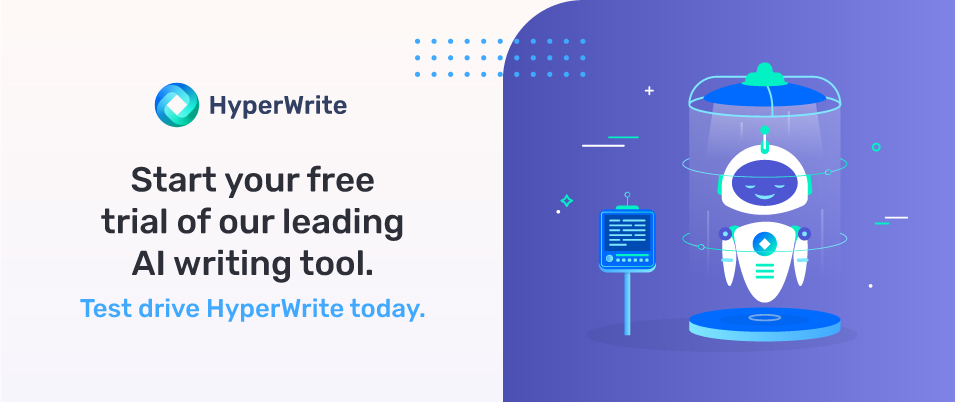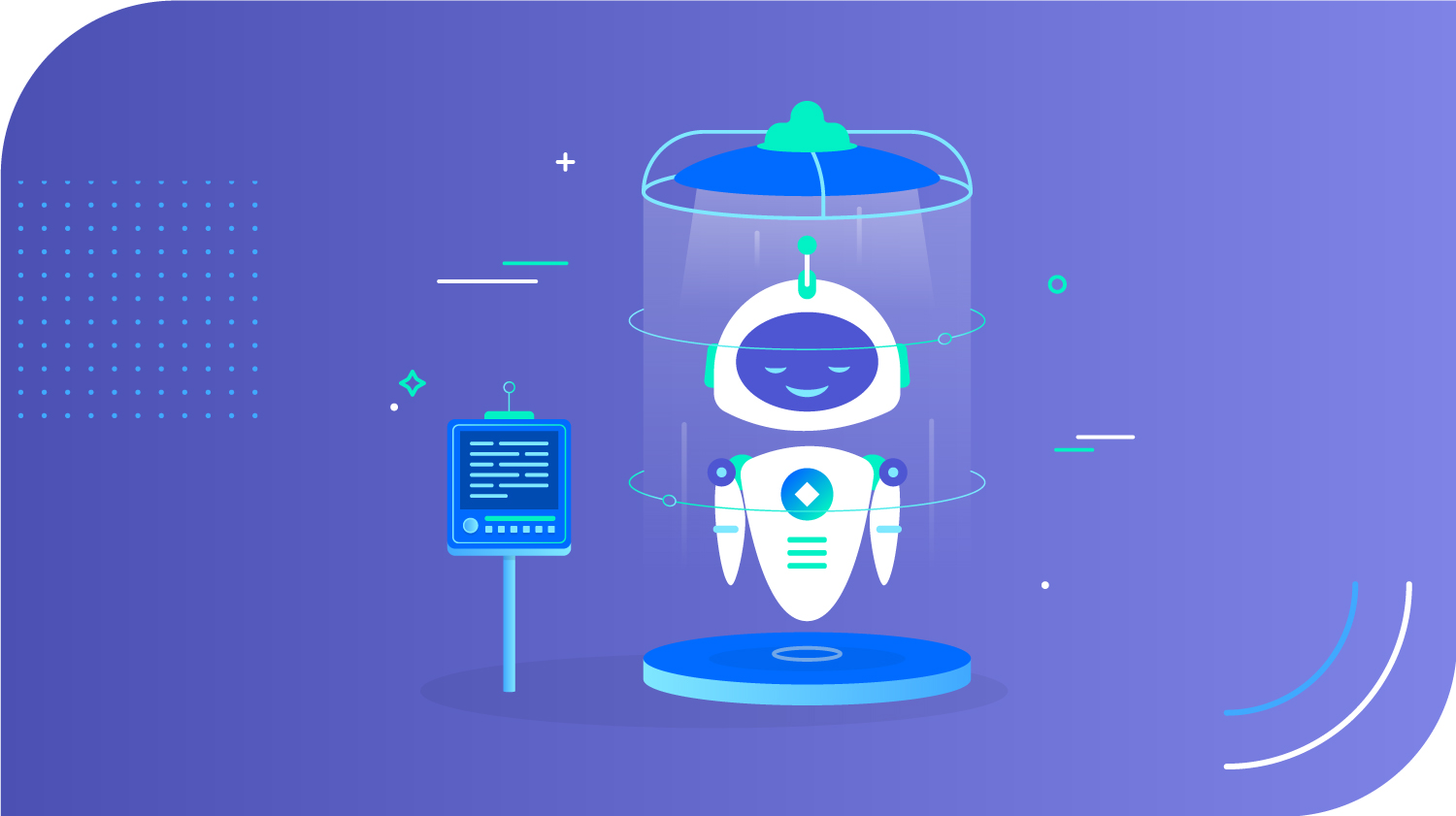Auto mechanics have diagnostic tools.
Grocery stores have self-checkout.
Security has automated cameras.
…And now, writers have AI-powered writing software.
Technology is in every field out there. So, it’s no surprise that it also entered the field of language through GPT-3 deep learning technology.
Stephen Marche addressed several leading questions about the impact of GPT-3 AI-powered writing in his article for The New Yorker, “The Computers Are Getting Better at Writing.”
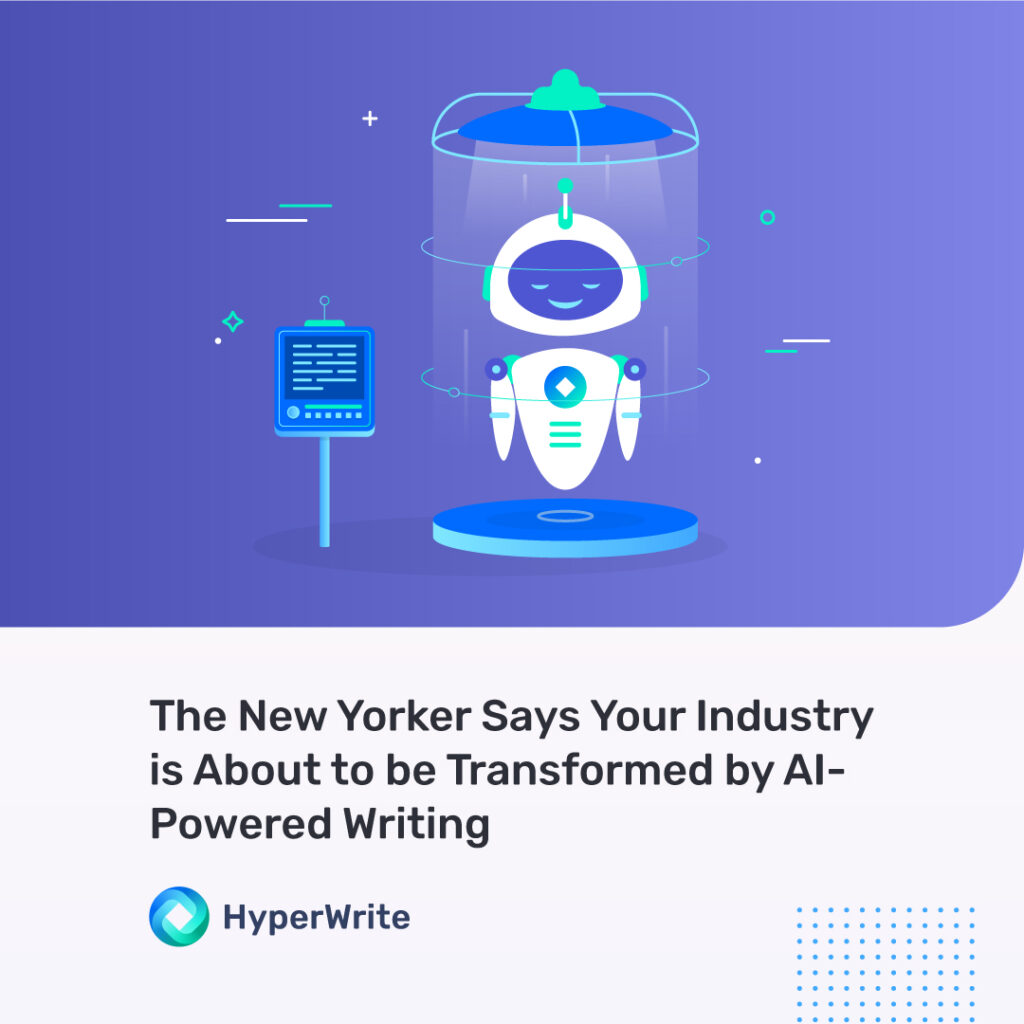
Can AI Writing Really Sound Like a Human Author?
Do you think you could distinguish between an article written by a human and one written by AI? This question is what opened Marche’s article on the impact of AI writing in content creation.
AI is no longer the awkward, clunky technology of the past, creating sentences with humorous and confusing wording. Now, GPT-3 language generators can create human-like content that not only sounds natural but even copies an author’s style.
Are you not convinced yet? Then, take a look at some examples of AI mimicking famous authors.
This example used by Marche in his article is based on “The Metamorphosis” by Franz Kafka. Marche replaced the second half of Kafka’s story with a section written by the AI writing generator, Sudowrite. The result is as follows.

While that piece sounds eerily like a human author, you may still doubt how much of that piece AI wrote.
Here’s the first paragraph of another viral example of GPT-3 generated text that sounds like a human author. The Guardian published this article. However, the authors of this piece admitted to editing multiple text generations to achieve the final piece.

Now let’s examine an example created by our own free AI writing software, HyperWrite. We decided to go the same route as Marche and use a famous literary script to inspire our AI writer. This is the resulting text, with the first paragraph taken from J.R.R. Tolkien’s The Hobbit.
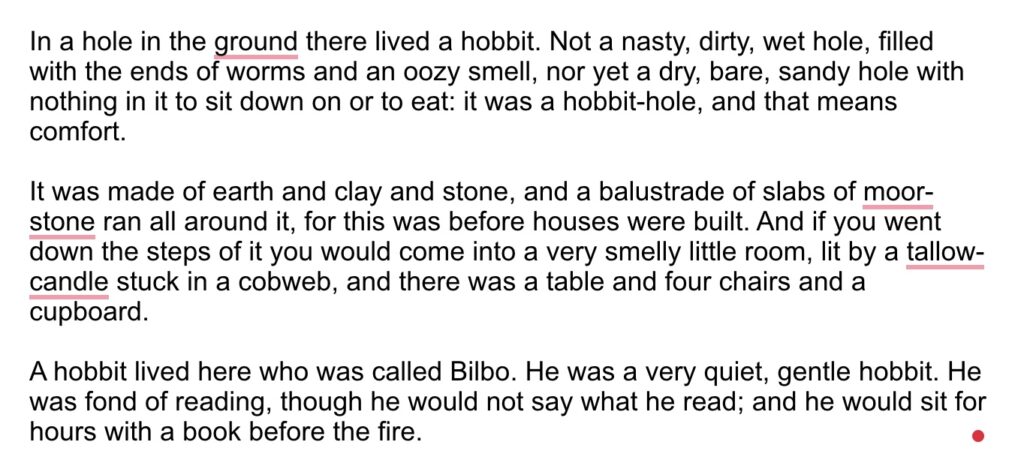
One Key Ingredient AI Writing Generators Can’t Replicate
Those three examples have all the right words in the proper order (for the most part), giving the texts an authentic sound. But AI writing has its limitations.
Everything that the AI-powered writing assistants created is merely a reflection of the author’s work. The words, ideas, thoughts, and emotions didn’t come from GPT-3. Machines can’t think and feel like humans. Instead, it’s copying the author’s style.
GPT-3 writing assistants can’t generate emotional text on their own without having a pattern to copy. However, with the help of a human author feeding it feelings, original ideas, and a unique style – GPT-3 writing can continue providing content with authentic emotions.
Who Is Considered the Author of AI Writing?
Another example of AI-generated writing is this version of “Kublai Khan” generated for The New Yorker article.
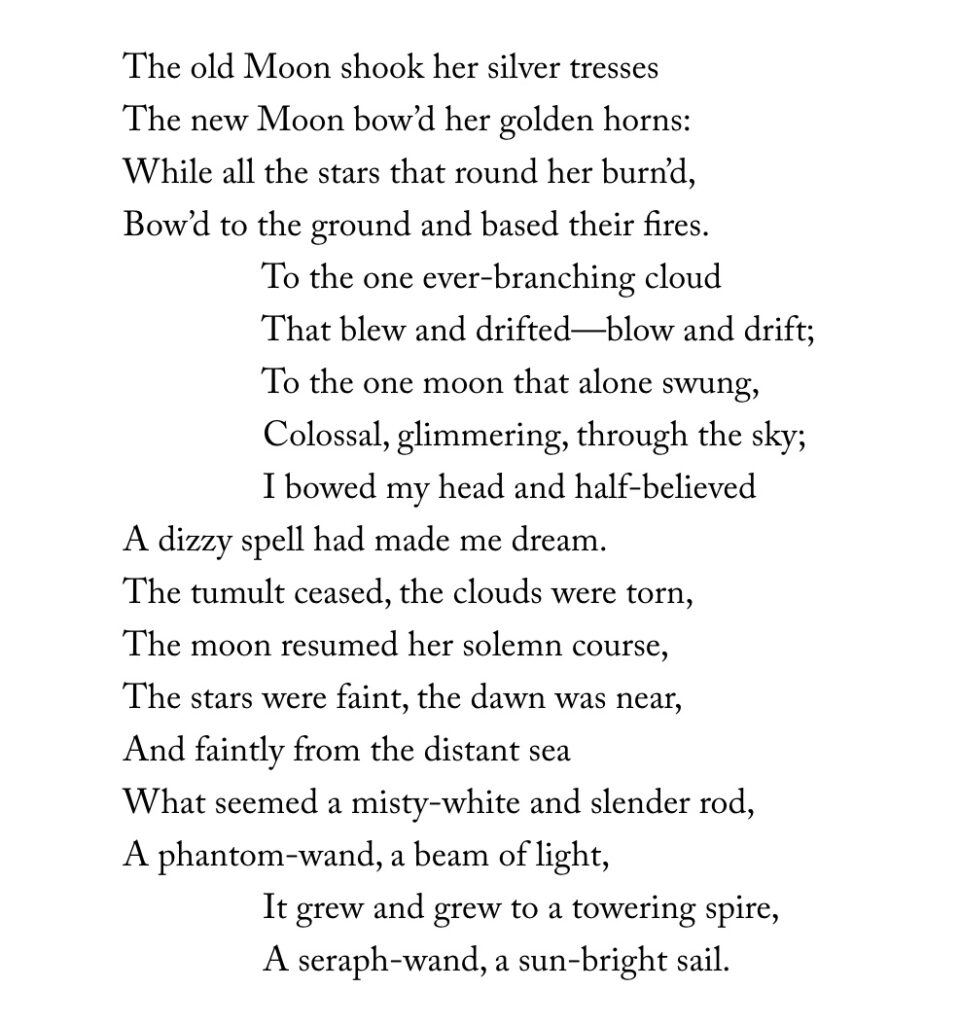
Since GPT-3 wrote this poem in the original author’s style, is Coleridge still the author of this piece?
Or is it Marche since he was the one who used AI to generate the text?
Maybe AI is the author since it generated the actual words?
Marche gives a unique look into this question. In his opinion, authors aren’t the true originators of their work. Instead, even prominent writers like Coleridge drew inspiration from someone or something else.
For example, Elton John wrote “Candle in the Wind” about Marilyn Monroe and her untimely death. The lyrics are Elton John’s, but the story wasn’t his original idea.
So if you create a piece with an AI writing assistant online, are you the author or the inspiration?
According to Dictionary.com, an author is a person who writes. Therefore, the term “person” implies that an author can’t be inanimate objects, including AI.
The third definition of an author replaces the term “writer” with “maker.” In that case, even if someone doesn’t write a piece, they can still be the author. Anyone who makes content, even if making only involves pressing a text generation button, is an author.
Does AI Writing Sound Like a Robot?
Many people shy away from using AI to create their content because it may sound robotic. Up until this point, most AI assistants did sound like awkward, mechanical people. For example, Siri or your navigation system both used stilted and predictable phrases.
But AI writing generators are more advanced than any of those other AI assistants. Though, at times your AI-generated content may still sound like a robot. But that’s ok. You won’t be submitting that first draft for publication anyway.
However, if you want to cut down on your editing time, find AI writing software that sounds more human-like. The best writing assistant software will come with a guarantee of natural-sounding language, like the guarantee we make about HyperWrite.
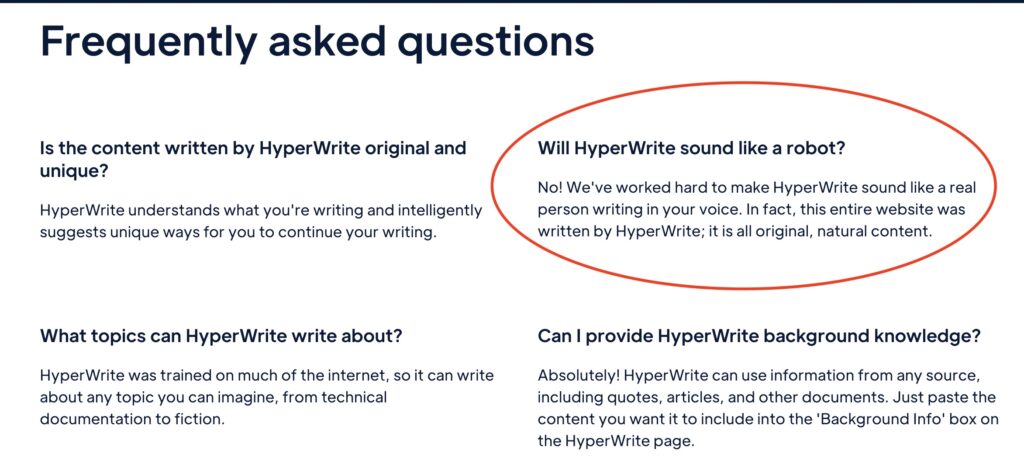
Marche makes a good analogy about AI content writing. He says that AI writing doesn’t sound like a robot but rather a beginner who isn’t quite entirely comfortable writing.
But following through with this idea means AI can and will learn to write better in the future. We are just in the infancy of GPT-3 and need to teach it how to write more fluidly.
How Do People Respond to AI Writing?
People generally have two responses to AI writing.
- Disappointment because it isn’t as capable as humans
- Fear because it is as talented as humans.
If you are in the first group, you hoped that AI writing would do more of your writing for you. Then, you could skip the difficult aspects of writing words and focus on crafting ideas and editing content to produce pieces 2-5X times faster.
The future of AI writing is very bright. With the continual advancements in technology, AI writing assistants that copy humans more accurately isn’t too far away.
But you don’t need to wait for scientists to invent the next generation of GPT-3. It can already learn through observation. So start consistently using your AI-powered writing assistant, so it learns from you and begins to sound more natural.
People are also concerned that AI writing knows too much about how human authors write. Here are some common fears associated with this idea of an advanced human-like AI writer.
- I will lose my job if AI replaces writers.
- AI may try and control us in the future.
- If I write with AI, I am no longer the author.
In reality, AI can’t take over the world or control people because that would require AI to have human-like thoughts and motives. Instead, AI reacts to how people train it. As long as AI’s goals are aligned with our goals, AI will continue working with us instead of turning against us, as many movies portray.
Will Writers Still Have a Job?
Now we come down to the primary concern surrounding AI writing. How much longer will writers still be relevant?
Marche suggests that writers will continue having a place in the content creation process. He says that AI only transforms your job as a writer. Instead of your time centering around putting words on the paper, you can focus on editing.
As AI continues to advance, you’ll need to perform less mundane writing tasks. But will your job ever be entirely obsolete?
In the last ten years, the number of robots in the workplace has increased 300%. Economists predict that by 2030, robots will replace over 20 million manufacturing jobs. These are jobs with simple or repetitive tasks.
The more complex your job is, the less you need to fear AI.
For example, if your job is in the creative industry, you are nearly guaranteed job security. This is because robots don’t have the same capabilities as humans regarding creativity in the workplace.
What Are Some Potential Benefits to AI Writing?
Marche ends his piece by touching on some potential benefits of AI’s human-like writing.
In the literary world, AI could complete works by authors who have died. It could also write sequels to beloved classics. When human authors attempt to complete unfinished assignments, like Charles Dickens’s “The Mystery of Edwin Drood,” the work always ends up having a touch of that author’s personality.
However, since AI doesn’t have its own personality, its writing is based entirely on the original author’s style and will sound more like that author. With enough training, this means AI may eventually help an author complete an entire book series faster (we are looking at you, George R. R. Martin), or content teams complete more blog posts in half the time.
The Future of Content Creation is AI-Powered Writing
Whether writers like it or not, AI-powered writing is here to stay. Authors can either start using AI creative writing assistants or be left behind. If you want to stay ahead of the times, begin learning how to work WITH AI writing software instead of fighting against it.
HyperWrite offers a free AI writing assistant so you can start practicing how to incorporate AI writing in your next project.
